Forty percent.
That’s the percentage rating given by B2B marketers on the effectiveness of a case study. Based on this CMI report, customer case studies are the most effective content for turning your potential clients into buyers:

Despite the positive impact of customer case studies, many brands do not take advantage of this marketing asset which works like a charm. And even when they do, the case studies do not tick the right boxes. Hence, they fail.
This post will dive deep into written case studies, what they are, how to create them, and the tips that make the case study writing process painless.
What Is a Case Study?
A case study is one satisfied and happy client telling a possible buyer that your product or service can solve their problem.
But a case study is more than a mere testimonial.
Case studies show how customers used your product/service and got massive results. For instance, in this Optinmonster case study, the outcome of the client’s use of the product is clear:
- 1,800+ monthly email subscribers
- $17,000 average sales profit
- 35% increase in website retention rate

After watching or reading a case study, the prospective customer should be able to visualize their problem being eliminated by your solution. They should have a clear idea of the process you used to solve your customer’s challenge in the case study.
Similar to buyer personas, your case study should focus on a specific customer. This way, the prospective client can relate to the exact challenges that faced the customer, as well as how your solution helped. Before delving into how to write a customer case study, let’s examine the benefits of creating one.
Dive Deeper:
* The Ultimate Guide to Developing Buyer Personas (with Templates!)
* The Science of Building Buyer Personas (Infographic)
* 4 Steps to Discover Your Ideal Buyer Persona for B2B Marketers
3 Benefits of Creating a Customer Case Study
1) Customer Case Studies Build Credibility
Your prospective customers will rarely search for a case study with headlines like these in the search engines:
- How We Helped Twenty20 Increase Their Customer Acquisition Volume
- See How We Were Able to Boost Visibility Across a Range of Common Search Terms
- A Group of Clinics Specializing in Laser Hair Removal
This is why you need to understand the role of every type of content (blog posts, e-books, podcasts, etc.) in the buyer journey. As highlighted in the CMI report in the intro of this post, the main kind of content for making prospective customers aware of your brand is blog posts:

Once customers become aware of your brand through your detailed blog content, you have won half the battle.
Creating case studies helps boost your credibility because they show that you know what you’re doing – not theoretically, but in practice.
Dive Deeper: How to Optimize Your Content Strategy with the Buyer’s Journey
2) Customer Case Studies Provide Social Proof for Your Business
According to Brian Halligan, CEO and Founder of HubSpot, “There’s this crisis of trust going on.” Your potential customers repeatedly hear the same rhetoric of how your competitor can help them solve their challenges.
In the earlier days of the Internet, a well-written sales page or website copy was enough for prospects to buy. Today, however, the game has changed as many consumers have been burned by products and services that failed to deliver.
You can stand out from the pack with a case study that is filled with cold, hard facts.
Dive Deeper: How to Create the Ultimate Marketing Funnel (Templates Included)
3) Customer Case Studies Attract Backlinks
Your website’s goal is to get organic traffic, engage your potential customers, and make them take action (buy, download, sign up, etc.). But search engines won’t send organic traffic to your website if other sites aren’t vouching for your authority by linking to your content.
Hence, you need backlinks, and writing a case study can help you attract them.

How to Write a Customer Case Study
So now that you understand the benefits of creating a case study on one (or more) of your customers or clients, let’s get in to how to go about writing one.
Step 1: Find a Customer
Finding a customer is the first – and crucial – step in your case study writing process. Your sales, marketing and customer support teams are excellent points of contact for identifying clients that love your product/service.
You can also find suitable customers for your case study online. It isn’t uncommon for your happy customers to leave great reviews on websites like Trustpilot.com, Clutch.co, social media platforms like Facebook, and many others.
However, it is impractical to check review websites to find customer success stories manually and regularly, so here’s what to do instead: use Google Alerts.
Setting up Google Alerts allows you to monitor mentions of your brand name online. Here’s how to do it:
- Visit Google Alerts

- Create an alert for what you want to monitor. For instance, for Single Grain, we can use the following:
- Single Grain
- Single Grain Blog
- Eric Siu (name of a prominent person in your business)
Regardless of your approach for finding a suitable case study prospect, these are the points to look for in a client review:
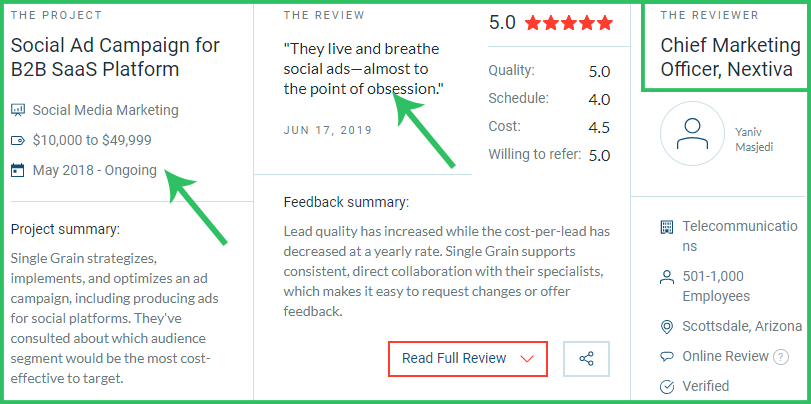
- Brand popularity: Writing a case study for a well-known brand lends more credibility to your business.
- Excellent results: The proposed customer for the case study should have gotten some outstanding results.
- Project timeline: You need a client that has used your product/service for an extended period and, preferably, fairly recently. What if the time period is short? Go ahead with the case study, but you’ll need to update it to show better results in the future.
- Understanding of your offering: You need a customer that understands what you do. If they don’t, it might be difficult (but not impossible) for them to give you accurate information on how your product/service helped.
Step 2: What’s in It for the Customer?
Not every customer will agree to your request to feature them in your case study. But you can break this hesitancy by offering something in return; it is, after all, human nature to feel moved to give in response to receiving something.
Here are some benefits you can offer to make your case study prospect consider working with you:
Brand Exposure
Every brand wants to get its name out. They want people to know them. Although SEMrush does not offer special conditions for their customer success story clients, when I spoke to Mila Varavina, Marketing Communications Manager at SEMrush, she made this clear:
“For some companies, it’s important to get brand exposure and promotion across our super-engaged community on all SEMrush channels.”
More exposure equals more opportunities to reach new potential customers.
But be specific when you propose brand exposure to a case study prospect. Rather than saying something generic, mention that they will get in front of your:
- 11,322 Twitter followers
- 19,781 Facebook followers
- 1,346 Instagram followers
- 1 million people from your paid promotion efforts
Backlinks/Website Traffic
Backlinksyour case study prospect
Note: Although Google is against paying for links, it is still a common sight.
As per Ahrefs: The average cost of buying backlinks in 2018 was $361.44 (or $77.80…plus content). This amount increased by 2.4% from 2016.
In 2023, the situation is different, since the costs of backlinks are much higher. I pitched a website with a domain authority of 70+ to write a guest post. I got a response on how their guest posting process works. And for the sake of discretion, I’ll rename the packages:
- Basic: Publication wait time – 4 months. Free
- Standard: Publication wait time – 4 weeks. $500
- Pro: Publication wait time – 1 week. $1,000
- Guru: They write the post and publish it – $2,000
Offering to feature a customer in a case study saves this cost of acquiring backlinks.
Product Discount
An enterprise clienta sweet product discount
Free Access to Updates
This strategy works for course creators. Since the recipient has gotten value from the current course, they can be sure that the updates will be excellent. Plus, they will get it at zero cost.
Dive Deeper: How to Get Premium Backlinks When No One Knows Who You Are
Step 3: Ask for the Customer’s Permission
There’s no one-size-fits-all approach for requesting your customer’s permission for a case study. Depending on your relationship with the customer, you could whet their appetite for the case study with a phone call that discusses their successes and challenges. You can also chip in a couple of benefits from a case study collaboration.
Regardless of which approach you take, you need to make the case study writing process formal by requesting your customer’s permission via the written word, such as an email.
This email should contain what’s in it for the customer, the process for creating the case study, and how you intend to use it. Here’s a template you can modify:
Hi [customer name],
We are thrilled about the remarkable successes you’ve achieved with our (product/service). We also love and appreciate your comprehensive feedback at [name of review website].
My name is [name]. I handle the case study writing process at [organization name]. My team is excited to tell your success story in detail by writing a case study that offers a win-win. Are you open to working with us to create this case study?
Here are some benefits of getting featured in this case study:
- Case study benefit 1
- Case study benefit 2
- Case study benefit 3
- Case study benefit 4
Our case study writing process is simplified and typically takes less than one month to complete, depending on your availability. Here’s how the process looks:
- One [X]-minute phone/video/email/in-person interview
- Writing the case study based on the content of the interview
- A review of the draft case study by you/your team
- Adopting of suggested edits
- Sending you the final copy for review
- Promoting the case study via our channels [list how you want to promote the case study]
Also, we will require some of your brand assets for designing the case study like:
- Brand asset 1 [such as a logo]
- Brand asset 2 [the headshot of the person you’re working with]
- Brand asset 3 [screenshots of their increased sales/downloads, etc.]
We sincerely hope you are open to working with us. I earnestly await your positive response.
[Your name]
Step 4: Write Your Case Study Questions
You need to write an extensive list of questions to ask after your customer agrees to collaborate on the case study.
After writing the questions, identify those related to success metrics and send them to the customer. This gives the customer an idea of what to expect. It also reduces or eradicates the need for unnecessary follow-ups by allowing the customer to think about and prepare their answers.
Your email should also state that the questions are to give them an idea of what you need. You don’t want to scare or overwhelm the customer into backing out of working with you.
You’ll get the best results from your case study interview by asking questions in this structured format:
Chit-Chat and Introductory Interview Questions
These simple questionsthe customer
- Exchange pleasantries, like weekend plans or where they live/work.
- Zero in on the work by explaining what you do at your job, and then asking the customer what specifically they do at theirs.
- Ask questions about their role, like whether they do the job alone with a team.
Problem Identification Interview Questions
These questions examine your customer’s situation before they found your brand – and remember to seek answers that are as specific as possible:
- What specific challenges did you/your team encounter with [the problem]?
- In your opinion, how did these challenges impact your revenue?
- Did you try other ways to solve the problems before coming to us?
- Why do you think the other products/services didn’t work?
- How did you find us [the solution]?
Solution Identification Interview Questions
These questions identify the problems that your solution solved and why it is unique to this customer:
- What were your initial thoughts about [your solution/brand]?
- What was the differentiating factor that made you opt for [your solution/brand]?
- Did any of our marketing materials like case studies, free e-books, email, etc., convince you to work with us?
- How quickly did you start getting results?
Results Interview Questions
These questions help you understand the results this customer achieved with your solution – and remember to seek answers that are as specific as possible:
- How has your business improved since you started using/working with [your solution/brand]? Don’t just settle for “it’s much better!”; you’re looking for actual before and after numbers.
- In terms of ROI, can you place a value on the impact of our solution (percentages are fine too)?
- On a year-over-year basis, did our solution double, triple or quadruple your revenue?
After the interview, request permission from the customer to do one follow-up call with additional questions (if any).
Step 5: Decide on the Interview Format
You can conduct your interview using the following formats:
- Video
- Phone
- In-person
However, of the four methods, I prefer video. Here is why:
- Doing a video interview enables you to get nonverbal cues from the customer. You’ll quickly know when the customer is uncomfortable with a question or doesn’t have the correct answer. This allows you to note relevant questions to ask during your final round of follow-up.
- Video interviews are also a great choice if you are interviewing multiple people in the same company. Plus, you won’t need to travel to do it.
- Having the interview on video allows you to easily go back and review the answers again.
If your customer opts for a video interview, be sure to do the following:
- Check your Internet connection: You don’t want to lose valuable information and ask customers to repeat themselves. You won’t be taken seriously, and you’ll be butchering the excellent image of your brand.
- Allow your customer to speak: Listen more and talk less. If you are talking too much or at the same time as your customer, you will lose valuable information.
- Ask for permission to record the conversation: If your customer is open to this, of course, do it. This ensures that you can easily refer to any part of the conversation at any time.
Step 6: Writing Your Case Study
Now you’ve got all the information you need. In this step, you will put together everything from the interview and draft a compelling case study.
Write a Great Headline
Your title should be full of benefits and answer this question: “Why will this case study interest future prospects?”
Anything that directly impacts revenue and shows remarkable results will make a great title. Where available, use numbers and percentages, as they are excellent for attracting prospects:
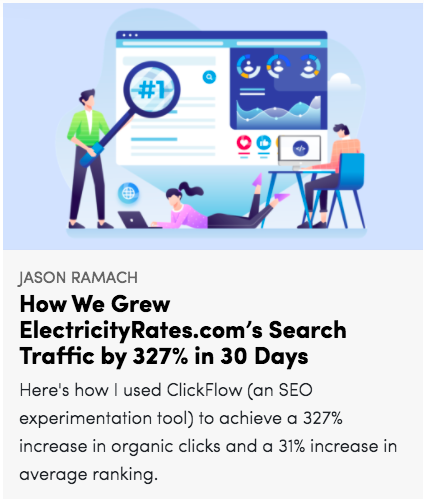
Let’s examine this case study title, why it works, and who it attracts:
Powerful Business Communication Suite Gets More Leads… for Less Ad Spend
- “Gets More Leads”: Every business wants leads.
- “For Less Ad Spend”: This shows that the featured customer in the case study had been spending more money and getting fewer results – a common problem for many companies.
Hence, this title will interest the following prospective customers:
- Those that have failed with ads
- Those that are new to ads and do not want to fail
- Those that believe they are spending more money on ads and getting subpar results
- Those that want more leads in their business
Your title is important and could mean the difference between a read case study or one that a potential client ignores. Every word in your title should count.
Introduce Your Customer
In the first two or three sentences of your case study post or page, summarize what your customer does. The following points can guide you:
- What type of business is it and what do they do?
- Who does the business serve? What is their target demographic?
- Where is the business located?
State Your Customer’s Challenges
There are no hard and fast rules about discussing your customer’s challenges. It could be three to four sentences or more. What’s important is identifying the significant challenges that your customer had been facing and discussing how they negatively affected their sales, revenue, growth, etc.:

Your Solutions to the Challenges
This is where you show how you eliminated the challenges of your customer with your specific product/service’s solution. Mention every improvement you made for the customer.
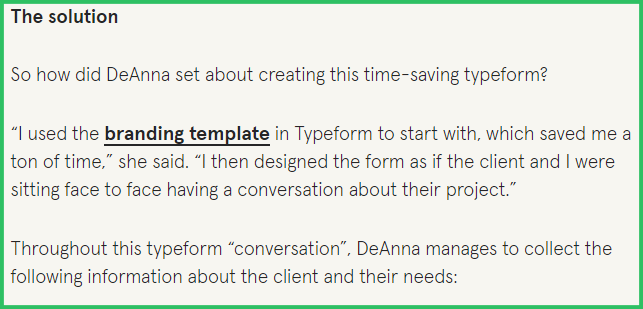
The Customer’s Results
The case study results section should discuss percentages, year-on-year increases, number of new clients for your customer, number of increased leads, etc. This is where you show off what you can do for prospective customers who are reading the case study:
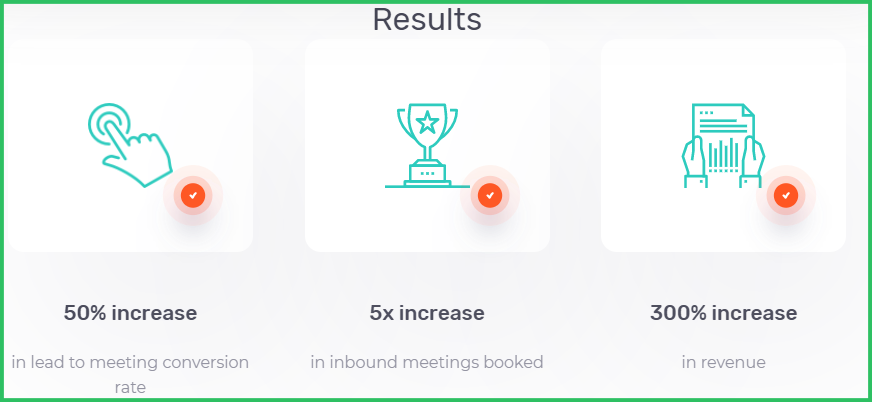
Customer Quotes
Always use direct quotes from the customer in your case study. If there are any quotes that are particularly enticing, set them off with bold type, indents or a dialogue box. And you can use them on any section of your case study, provided it fits.
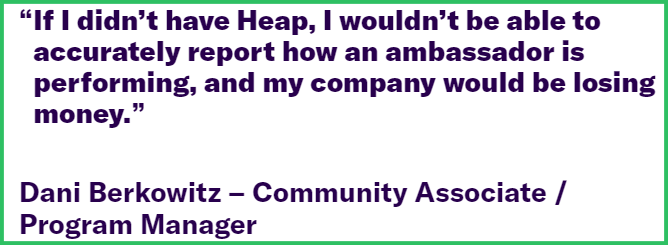
Call to Action (CTA)
Your case study shouldn’t end with “contact us,” “want to work together?” and so on. Your CTA should tell your prospective customer what the next step is and why they should take that step.
Here’s an example for the Single Grain case study mentioned just above:
Ready to Get More Leads with Less Ad Spend?
Single Grain generates more leads at a reduced cost than most marketing agencies.
Click here for your FREE consultation.
If you’ve put a lot of thought into the headline of your case study, you’ll see that the CTA and the headline look similar.
Last Step: Promote Your Case Study
Promoting your case study is the final step – but no less important than creating it. As Derek Halpern has famously said:
You should be spending 20% of your time on content creation and 80% on content promotion.
Your prospective buyers won’t see your case study unless they land on your website. And your website is one out of the many places for promoting your case study.
Depending on your agreement with the customer, you can use these additional methods to promote your case study:
- Send the case study to your email list
- Write five posts each for different social media platforms (Facebook, LinkedIn, Reddit, Quora, Twitter, etc.) and link to the case study. Promote these posts for 30 days.
- Place the case study on the featured section of your LinkedIn profile.
- Pin the case study on your Twitter profile.
- Promote it with paid ads.
- Write a blog post and link to the case study.
- Do a guest post campaign and link to the case study.
- Distribute the case study at conferences.






































